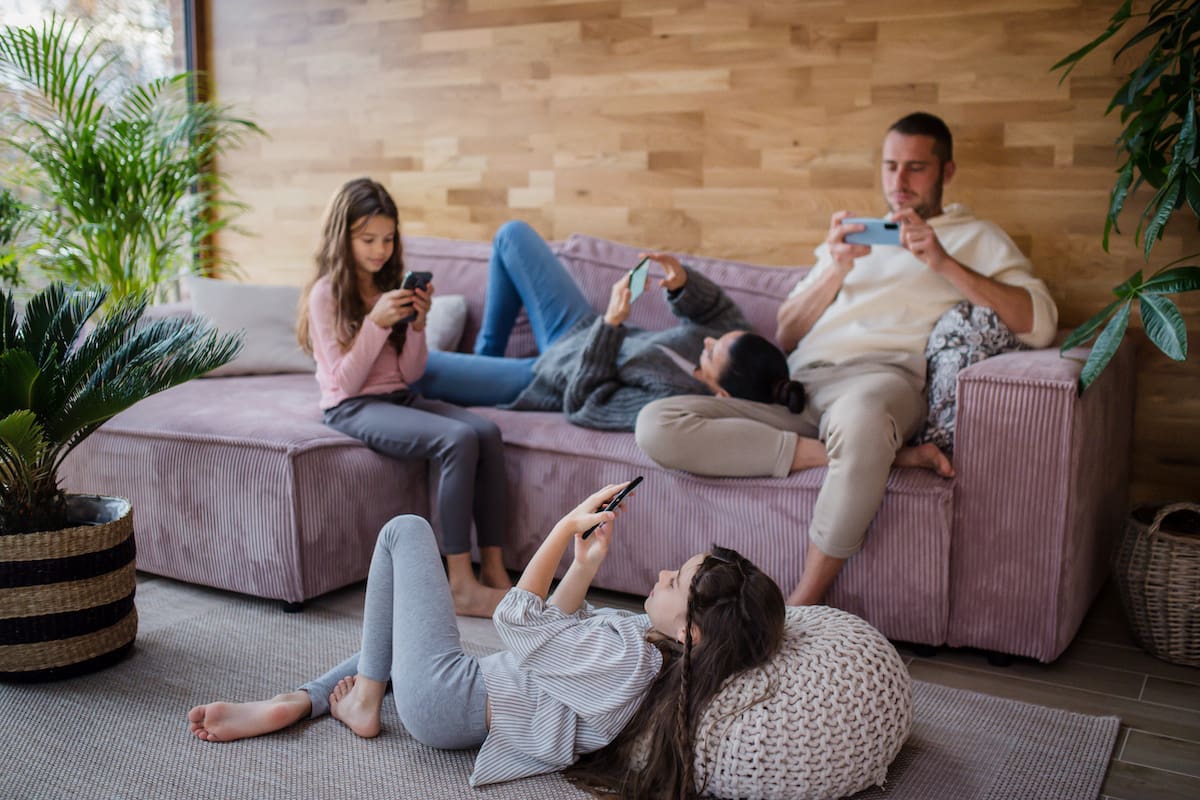Nomophobia is a form of anxiety you may not have heard of, but know exactly how it feels. Where’s your phone right now? Wherever it is, chances are your phone is within easy reach and you wouldn’t leave the room without it. Standard. But for some of us, that sense of dependence on a device escalates to the point where the thought of being without a phone is a genuine source of anxiety and fear. Now that worry has a name: nomophobia. Here’s what you need to know.
Nomophobia defined
Nomophobia, short for “NO MObile PHOne phoBIA,” describes the fear or anxiety of being without your mobile phone or being unable to use it.1 People experiencing nomophobia often feel a sense of panic, restlessness, or extreme discomfort when they are separated from their devices or unable to access them. This condition can significantly impact daily functioning and overall well-being.
How common is nomophobia?
The prevalence of nomophobia has been steadily increasing as mobile phone usage becomes more ubiquitous. Recent studies have estimated that around 66 per cent of the global population experiences varying degrees of nomophobia.2 The pervasive nature of smartphones, ubiquitous wifi and our constant digital connectivity have contributed to the rise of this very modern condition.
Who is most likely to suffer from nomophobia?
Nomophobia can affect individuals of all ages, genders, and backgrounds.1-3 However, certain factors may increase the likelihood of developing this condition. People with pre-existing anxiety disorders or high levels of stress are more susceptible to nomophobia. Additionally, individuals who heavily rely on their smartphones for work, social interactions, or entertainment are at a higher risk.2
What are the symptoms of nomophobia?
The symptoms of nomophobia can manifest both emotionally and physically.2 Emotionally, individuals may experience overwhelming anxiety, restlessness, agitation, irritability or fear when they are unable to access their phones. Physically, symptoms may include rapid heartbeat, sweating, trembling or nausea. These symptoms can interfere with daily activities and may lead to social isolation or avoidance of situations where phone use is restricted.1-3
Do I have nomophobia?
If you find yourself constantly preoccupied with your mobile phone, experiencing anxiety or discomfort when it is not accessible or feeling compelled to check it frequently, you may be dealing with nomophobia.1-3 However, only a qualified healthcare professional can provide an accurate diagnosis. If you suspect you have nomophobia, talk to your GP about your symptoms so they can provide appropriate guidance.
How can I get help for nomophobia?
Treating nomophobia uses the same evidence-based strategies for treating other phobias and anxiety disorders. It involves a combination of psychotherapy, cognitive behavioural therapy (CBT) and lifestyle modifications such as incorporating relaxation and mindfulness into daily life.
CBT in particular can be useful for learning to identify and challenge irrational thoughts and beliefs surrounding mobile phone usage. For some people, it may also be useful to include gradual exposure to situations that trigger nomophobia in therapy to foster desensitisation to being without a phone. Furthermore, relaxation techniques, such as deep breathing exercises or mindfulness, can be useful in managing anxiety symptoms.
In addition to therapy and mental self-care, it’s important to establish healthy boundaries and practices related to mobile phone use. Setting specific times for phone-free activities, engaging in offline hobbies and limiting screen time can help reduce dependency on mobile devices. Building a support system of friends and family members who understand the challenges of nomophobia can also provide valuable emotional support.
What are the long-term effects of nomophobia?
While the immediate consequences of nomophobia can be distressing, the long-term effects are still being studied. Excessive mobile phone use, driven by nomophobia, can lead to sleep disturbances, decreased productivity and impaired social interactions. It may also contribute to feelings of isolation, strained relationships, and a diminished sense of wellbeing. Ongoing research is necessary to fully understand the potential long-term implications of nomophobia.
In the meantime, nomophobia is a growing concern in our digital society. Recognising the signs and symptoms of nomophobia is essential for effective management. Seeking professional help and adopting healthy phone usage habits can alleviate the distress caused by nomophobia and promote a healthier relationship with mobile technology. By finding a balance between digital connectivity and real-life experiences, it’s possible to navigate the modern world free from nomophobia.
REFERENCES
1. Bhattacharya S, Bashar A, Srivastava A, Singh A. Nomophobia: NO mobile phone phobia. J Family Med Prim Care. Apr; 8(4): 1297–1300. 2019 [cited July 7, 2023]. Available from https://pubmed.ncbi.nlm.nih.gov/31143710/
2. Notara V, Vagka E, Charalampos G, Lagiou A. The emerging phenomenon of nomophobia in young Adults: A systematic review study. Addict Health. Apr;13(2): 120–136. 2021 [cited July 7, 2023]. Available from https://pubmed.ncbi.nlm.nih.gov/34703533/
3. Alwafi H, Naser AY, Aldhahir AM, et al. Prevalence and predictors of nomophobia among the general population in two middle eastern countries. BMC Psychiatry 22, 520. 2022 [cited July 7, 2023]. https://pubmed.ncbi.nlm.nih.gov/35918684/





